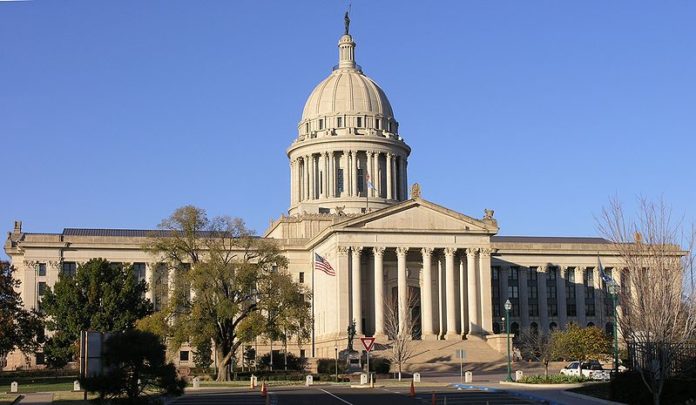BY DAVID PERRYMAN
 With the speed and dexterity of a street hustler, tax revenue and state assets are shifted from one account to another. Following the money becomes as difficult as a shell game or a round of Three Card Monte.
With the speed and dexterity of a street hustler, tax revenue and state assets are shifted from one account to another. Following the money becomes as difficult as a shell game or a round of Three Card Monte.
In 2004, voters imposed 12-year legislative term limits on members of the Oklahoma House of Representatives and the Oklahoma State Senate. The resulting shift of power is readily apparent when we observe an overwhelming tide of lobbyist-written legislation and bureaucrats in state agencies who have little concern about the “interference” of term-limited legislators.
Two case studies that deal with relatively high profile matters show who holds the real power is in Oklahoma government … and it is not the people or their elected officials.
An example of good government gone awry involves the railroad track running between the two largest metropolitan areas in the state. The Sapulpa to Oklahoma City railroad, known as the “Sooner Sub” is a thriving enterprise, but it was not always so.
For decades, the railroad was owned and operated by Burlington Northern. Ultimately, the rail line fell into disrepair and in the 1980’s BNSF sold the line for salvage value to the highest bidder. Fortunately, for all involved, the highest bidder on that track as well as seven or eight others was the state of Oklahoma.
Each of the lines, with the exception of the Sooner Sub, was acquired solely to preserve and protect it for future sale back to the railroad industry. With the exception of the Sooner Sub, each has either been sold by the state at a profit or is currently under lease to a railroad with the railroad company having the option to purchase the line from the state.
The Sooner Sub however, was not acquired for resale. It was purchased to foster passenger rail between Tulsa and Oklahoma City. Both legislation and contracts stated that intent.
Consistent with that goal, the railroad was leased to a company that nurtured its purpose, was contractually required to annually install thousands of new rail ties and provide a considerable cash flow to the state. By design, the line appreciated in value and has now caught the eye of a number of railroad companies, even the company that sold it to the state nearly three decades ago.
Despite legislative intent, the bureaucracy of the Oklahoma Department of Transportation has undertaken to initiate the sale of the Sooner Sub. Moving from landlord of the line to having no ownership of the line at all will decrease and possibly eliminate any hope that passenger rail between Tulsa and Oklahoma City will come to fruition.
The Legislature has no power to stop such a move; the public has no standing to demand to be heard. Legislators can blow trumpets from the mountaintop, but career bureaucrats are not afraid of elected officials who will only be around a few years.
In similar vein, lobbyist-authored legislation flies through without adequate scrutiny. A bill that on its face sounds great may have unintended circumstances.
For instance, HB 1875 was presented as the solution to a very real need. Municipalities are overly dependent on sales tax revenue. Sales taxes are collected for cities and towns by the Oklahoma Tax Commission pursuant to contracts that currently allow the OTC to retain around 1% to cover the cost of collection.
HB 1875 is designed to decrease the OTC retention to half of the current amount. If this bill becomes law, the 13 cities and towns in District 56 will cumulatively receive around $75,000 more in sales tax revenue.
For instance, Gotebo would receive about $190 more per year. Roosevelt would receive around $250 more per year. On the upper side, Anadarko could get around $13,500 more with Chickasha receiving $54,000. The other towns in District 56 would be somewhere in between.
If you would like to know your town’s share, let me know. How could that be bad? It pulls the money from the Tax Commission and gives it local government.
However, slipped into the bill, after it was filed, is a provision to keep the tax commission happy. For the Oklahoma Tax Commission to agree to allow $75,000 to go back to cities and towns in District 56, the Tax Commission will receive an additional $10 million from the general fund.
Money from the general fund that would normally be divided among schools, colleges, technology centers, highways, roads, bridges, counties and, yes, even cities and towns.
Money that could be used for COLAs for retirees or for raises to state employees who have not had a raise in eight years and are currently eligible for food stamps.
Money that provides funds for sidewalk projects and safe school projects.
Money that could be used for senior nutrition or health care.
Now, the real zinger. District 56 contains the same number of voters as the other 100 legislative districts. If District 56 generates approximately the same amount of sales tax revenue as the other 100 legislative districts, the Oklahoma Tax Commission would be giving up between $7 million and $8 million per year to receive $10 million per year from the general fund.
How is that for a powerful bureaucracy that increases its annual revenues by $2 million to $3 million by simply smiling? This bill will be coming up early in the 2014 session.
I want more revenue for our cities and towns. Is Three Card Monte the way to get it?
– David Perryman, a Chickasha Democrat, represents District 56 in the Oklahoma House of Representatives







